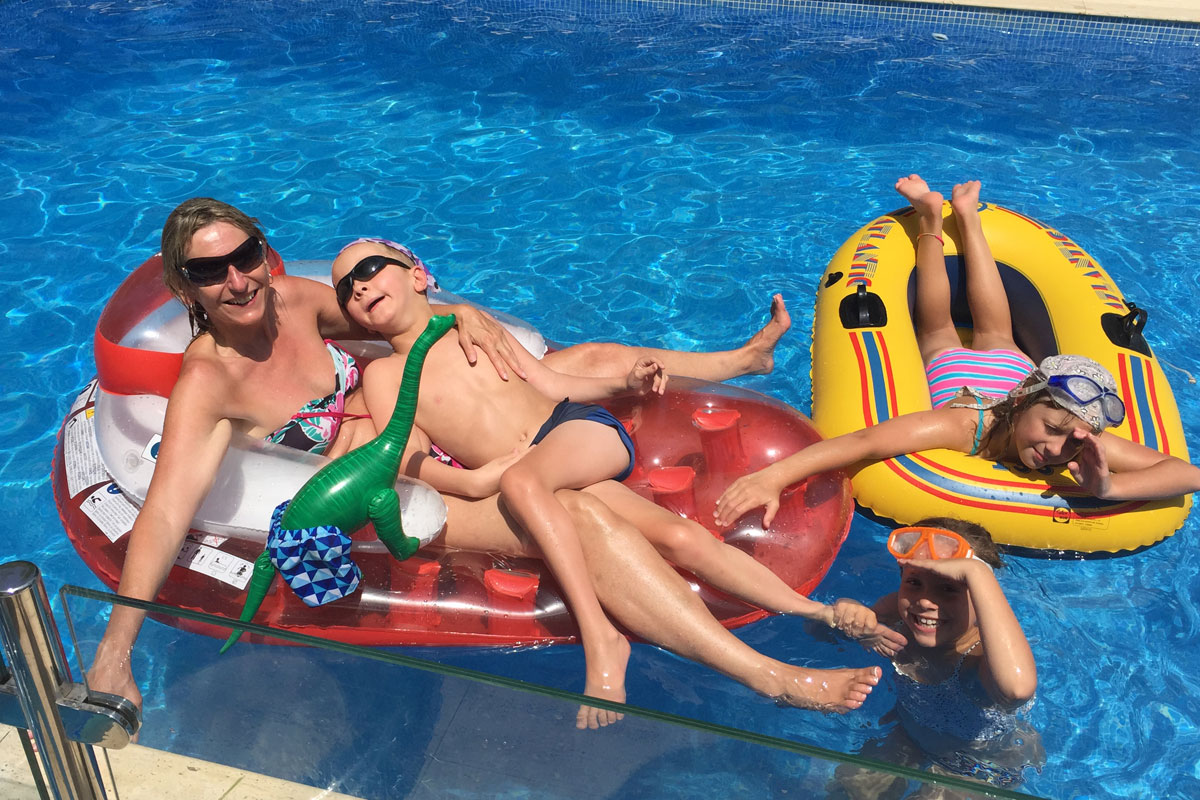As a mum to a 12-year old with mitochondrial disease, I understand as well as anyone how daunting the idea of planning a holiday can be when someone in the family has a disability. When just leaving the house presents a major challenge, the idea of going away for a week or two, leaving behind all your familiar care routines, can seem like an impossible task. There are so many factors to consider, from finding a hotel with wheelchair access to special dietary needs and ensuring the right equipment is available in an emergency, it's not surprising that many parents of children with mito opt to spend holidays at home.
This is a real shame, because while mitochondrial disease is a serious illness, it needn't stop families from enjoying holidays together, or prevent children from having incredible experiences that enrich their lives.
Having worked in the travel industry for 30 years, I've been in the ideal position to research holiday itineraries suitable for our son Alex, who's illness means he has severe physical disabilities requiring 24-hour care. What I've discovered is that while it does take a bit of effort, when you set your mind to it the sky really is the limit when it comes to disabled holidays. Alex is more well travelled than many other children his age. He's been with us to Mallorca, Ibiza, Sicily, and both Paris and Florida Disney Worlds. He's also been on several adventures closer to home, including sightseeing in London, camping in Norfolk, surfing in Devon, and even skiing on an indoor slope in Hemel Hempstead.
When I began posting Alex's adventures on Facebook, I was inundated with comments from parents of other children with mito who we knew through The Lily Foundation. At the next Lily Family Weekend, I spent the whole time answering questions about our holidays. People kept saying how brave we were to do these things with Alex, and then asking how they could do the same. I realised that many families with disabled children desperately wanted these experiences, but didn't know how to go about it, or lacked the confidence to try. Holidays overseas were generally seen as a no-go area if you had a severely disabled child, which I found heartbreaking.
Once word began to spread, I found myself answering more and more emails from friends with disabled children, asking for travel tips and advice. I started arranging travel itineraries for them, and eventually that evolved into the bespoke service we now offer at Designed4Travel, the company I founded four years ago with my sister and niece. Our aim is to support families who want to enjoy a proper holiday, and give mums and dads the confidence to venture further than their local park or beach with their disabled children.

Where mito is concerned every child's needs are different, so we start with a conversation to find out exactly how your child is affected and what those requirements are. Then we discuss what you'd like to do and where you'd like to go, and take it from there. We work out all the logistics and practical aspects, including travel insurance, which can be a real minefield for people with mitochondrial disease. We can also take care of flights, transfers, hotels, where to eat and what to do, so nothing is left to chance. If there are any obstacles or special requirements – for example if your child needs to bring oxygen on the plane – we can help arrange that. The aim is to take as much hassle and uncertainty as possible out of the holiday, so families can really relax and enjoy the experience. It comes down to building confidence, and giving people the knowledge and information they need to make informed choices.
Introducing your child to new experiences is a brilliant way of stimulating them, allowing them to develop as normally as possible and adding to their quality of life. We live every day knowing we might not have Alex tomorrow, but we can't let that rule our lives, or his. He's doing much better than his doctors said he would when he was first diagnosed, and we think perhaps the experiences we've given him have helped. When he was 18 months old we took him swimming in the sea, against all the advice from doctors saying he couldn't fight infection. We took the decision that if Alex was going to have a short life, it was going to be an exciting and fulfilled one, not one spent wrapped up in a bubble. Almost 13 years later, he’s still enjoying amazing experiences. We've always tried not to let his illness get in the way of him living a full life, and it feels good to now be helping other families to do the same.
6 tips to help you and your child get more from your holidays
Start with a camping trip
Camping is a great way to build up confidence and get your family used to a change of routine. Start by picking a campsite close to home, so everything you need is close by in if you need it. Most campsites are very well equipped with electrics, cooking facilities and water hookups. You might need to manage a bed bath or two, but there are ways of making it work. If camping isn't your thing you could try Butlins or Centre Parcs, which cater well for children with disabilities and has all the comforts of home. The Lily Foundation provides short breaks to Centre Parcs for some families affected by mitochondrial disease.
Don't be afraid to fly
Flying with a disabled child is not without its challenges, but once you master it, the world's your oyster. The charity Tryb4ufly offers a brilliant service where you can try out replica aircraft cabins, with a qualified occupational therapist on hand to help. If you're flying long haul to the US, Virgin provide specially adapted seats for children like Alex, who doesn't have good head control. Unfortunately, toilet access on planes is still an issue for people with disabilities. We had airline stewards closing the curtains around the toilet while we held Alex. It wasn't easy, but both times we've done it, with British Airlines and Virgin, the staff were amazing. Airlines need to improve in this area, and are under pressure from disability groups to do so. In the meantime there are ways to manage, and it shouldn't be a reason not to fly.
Get help with travel insurance
Finding travel insurance for a child with mito can be a real minefield. When you tell an insurer your child has mitochondrial disease, they tend to assume the worst and overcharge, when in fact many of the worst symptoms might not apply to your child. At Designed4Travel we have experience in this area and can help you find the best deal, negotiate the forms and avoid paying an excessively high premium.
Research the destination
When it comes to taking your child to a 'dream destination', it pays to do your homework. When we went to Florida we found Disney World was fabulous, really well equipped and easy to get around. Universal Studios on the other hand was not a good experience at all, and I don't recommend taking a child with severe disabilities there. Unless your child can sit unaided for more than two minutes they will not be able to take the rides. Small things make a big difference, so it's all about knowing what's available and planning in advance. Speaking to someone who has first-hand experience is the ideal way to do that.
Don't be afraid to try new things
There's very little you can't do with a disabled child these days. In Wales there is a company that offers specially adapted surfboards, so a child with disabilities can sit with an experienced surfer behind, actually surfing. We've taken Alex skiing on artificial slopes, where he sits in a specially adapted sledge. We're looking forward to taking him abroad to ski on real snow next. Basically if you have something you want to do then let us know and we can see what can be done to make it happen. And if we can't, we'll usually know someone who can!
Ask about disabled-friendly destinations
Increasingly, popular holiday destinations are being made more accessible to people with disabilities. Often it's the case that one relatively small change opens up a whole new region. For example, we're currently working to get a hoist and a disabled toilet seat out to Ibiza, so if a family wants to go on holiday there, they know the equipment they need can be ready at their destination when they arrive. We're also partnering with a really good medical centre on the island, so parents will have the comfort of knowing that if their child does take a turn for the worst, someone will be there to help.
Designed4Travel is kindly supporting The Lily Foundation by donating a portion of profits from bookings made through the charity to help fight mitochondrial disease. Just mention this article when you get in touch.

